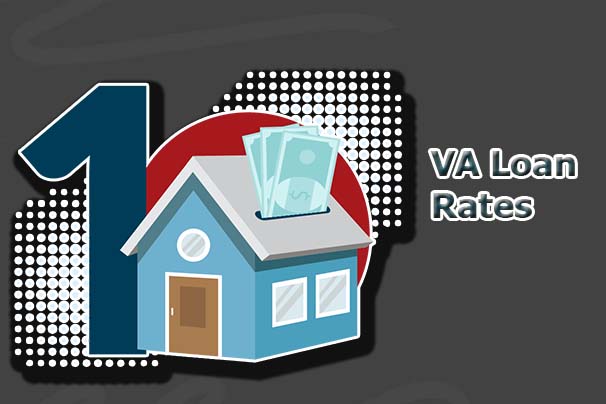VA Loan Rates – The Veterans Affairs loans offer financial aid and solutions for eligible veterans, active-duty service members, and certain members of the National Guard and Reserves. These loans are designed to make homeownership a dream come true for these veterans.

What’s more, it is also accessible by providing favorable terms, offering competitive interest rates, no down payment requirements, and no private mortgage insurance. Additionally, one critical factor one has to consider when securing a VA loan is the interest rate, as it affects the overall cost of the loan.
What Are VA Loan Rates?
VA loan rates refer to the interest rate that is offered to borrowers who are eligible for a VA loan. These rates are usually lower than most conventional loan rates due to the backing of the government, provided by the Department of Veterans Affairs.
Additionally, these rates are actually determined by individual lenders who offer VA loans, since the VA doesn’t really set interest rates. The lender’s risk is reduced by the VA’s guarantee, which allows them to offer more competitive rates to borrowers.
How Are VA Loan Rates Determined?
Here are the influencing factors that determine the VA loan rates:
Economic Factors
Varying factors like inflations, the Federal Reserve’s monetary policy, and overall economic growth influence interest rates across the board. An example is if the Federal Reserve increases interest rates to combat inflation, mortgage rates and VA loan rates, tend to rise as well.
Borrower’s Credit Score
A borrower’s credit score will also be a factor that is considered to determine the interest rate on a loan. Borrowers with higher credit scores are considered less risky and are thus given lower interest rates. Conversely, those with lower credit scores may face slightly higher rates on their loans.
Lender-Specific Factors
Every lender has its own criteria and terms for setting VA loan rates. These criteria may include the lender’s profit margins, operational costs, and competition within the mortgage market. As a result, VA loan rates can vary from one lender to another, which makes it great for borrowers to shop around comparing loan rates.
Loan Term
Another factor that determines how VA loan rates are the type and term of loan borrowed. The term of the VA loan is usually 15-year vs 30-year and the type of loan is usually adjustable rate vs fixed rate.
Typically, the shorter-term loans like the 15-year mortgages have lower interest rates than 30-year loans. Also, adjustable-rate mortgages might start with a lower initial rate that can adjust over time, whereas fixed-rate mortgages have their rates remain consistent.
Factors That Influence These Rates
Here are the factors that have been known to influence the loan rates you get on VA:
Market Conditions
One thing that influences the VA loan rates is the broader mortgage market. When the demand for mortgages is high, the lenders may have to offer more competitive rates to attract borrowers. Also, if demand drops low, the rates may rise as lenders want to maintain their profit margins.
Loan Amount
The size of the loan you take out can affect the interest rate. Larger loans may come with slightly higher rates because they pose a greater risk to the lender. However, VA loans often allow for higher loan amounts without requiring a down payment.
Loan-to-Value Ratio
The LTV ratio is the amount of the loan that is compared to the appraised value of the property. VA loans will allow you to make 100% financing with no down payment. However, the lower LTV ratio which is achieved through a down payment, can lead to better interest rates because it reduces the lender’s risk.
Interest Rate Lock
An interest rate lock is an agreement between the lender and the borrower to lock in a specific interest rate for a set period. This is usually from when the loan application is approved until when it’s closing. While locking in a rate protects the borrower from fluctuations, the length of the rate lock period also affects the interest rate.
How to Secure the Best VA Loan Rate
If you are looking for the best ways you can secure a really good loan rate, here are steps you can take:
Improve Your Credit Score
VA loans are actually accessible to borrowers who have a poor or low credit score. However, improving your credit score is essential to helping you secure a lower interest rate. You can do so by paying down your existing debt, making payments on time, and avoiding opening new credit accounts before applying for a loan.
Shop Around for Lenders
There are different VA loan rates for different lenders, so it’s up to make the right choice for you. This involves you taking the time to compare rates from multiple lenders to ensure you’re getting the best deal. Also, there are online comparison tools you can use, and working with a mortgage broker can make this process easier.
Consider Different Loan Terms
It is up to evaluate different loan terms, such as 15-year versus 30-year mortgages. While shorter-term loans may come with higher monthly payments, they often come with lower interest rates. This could potentially save you money over the life of the loan.
Lock in Your Rate at the Right Time
One thing you should know is that interest rates can fluctuate daily, so it’s wise to lock in your rate at a time when rates are favorable. You can work closely with your lender to monitor market conditions and choose the best moment to lock in your rate.
Make a Down Payment
Getting a VA loan does not require you to make any down payment whatsoever. However, making one can reduce your loan amount and potentially secure a lower interest rate. Making a small down payment can make a difference in the interest rate you receive.
Using these tips could help you secure good interest rates on your VA loans. Additionally, it will pay you to work with mortgage brokers and lenders that are reputable. It could help make the process a lot easier for you.
Benefits of VA Loan Rates
Here are several benefits from taking a VA loan with good interest rates:
Competitive Interest Rates
The VA loans offer lower interest rates compared to conventional loans. This advantage results in you getting significant savings over the life of the loan. Therefore, this makes owning a home more affordable for service members and veterans.
No Private Mortgage Insurance
Unlike conventional loans, VA loans do not require PMI, even if the borrower doesn’t make a down payment. Fortunately, this can save borrowers money on their monthly payments and makes VA loans more attractive.
Lower Fees
Borrowing a VA loan limits the amount lenders can charge in closing costs, and this helps to keep the overall cost of borrowing lower. Additionally, some fees like the VA funding fee, can be rolled into the loan amount. Thus, it reduces the out-of-pocket expenses at closing.
Flexibility in Credit Requirements
There is more credit requirements flexibility when dealing with VA loans. This feature makes them accessible to borrowers with lower credit scores. This flexibility, along with competitive interest rates, makes VA loans an excellent option for many veterans.
Frequently Asked Questions
Here are some frequently asked questions you can check out:
How do VA loan rates compare to conventional loan rates?
VA loan rates are generally lower than conventional loan rates because the VA guarantees a portion of the loan. This reduces the risk for lenders and allows lenders to offer more competitive rates to borrowers.
Can I negotiate the interest rate on a VA loan?
Yes, borrowers can negotiate the interest rate on a VA loan. Shopping around and comparing offers from multiple lenders is one way to ensure you’re getting the best rate. Additionally, improving your credit score or making a down payment can give you more leverage in negotiations.
How does my credit score affect my VA loan rate?
While VA loans are more forgiving of lower credit scores, a higher credit score can still help you secure a lower interest rate. Lenders view borrowers with higher credit scores as less risky, which can result in more favorable loan terms.








